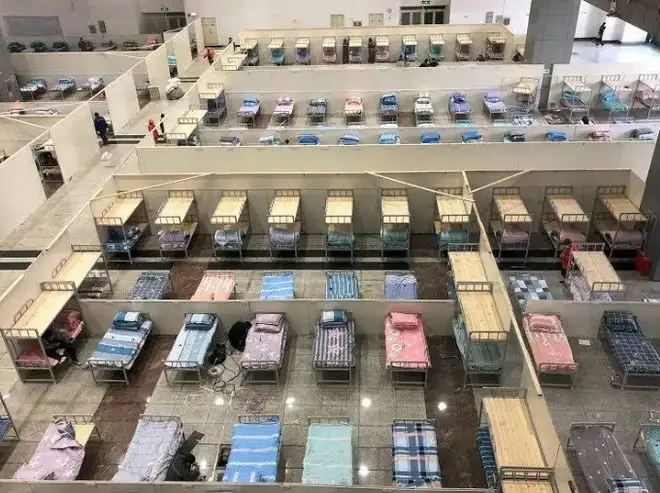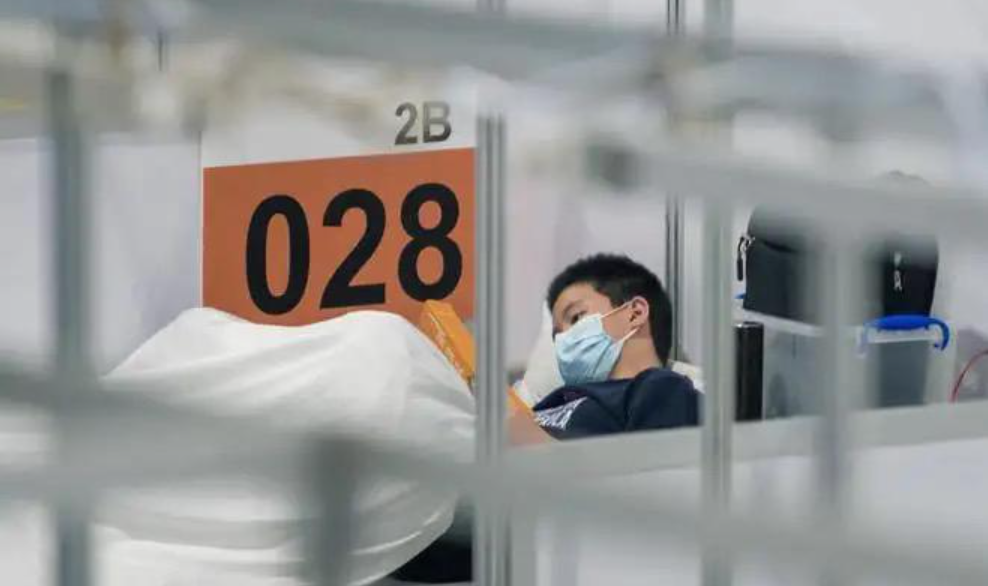
Why did she hang herself in the cabin?

32-year-old Xiaoya (pseudonym), after being tested positive and quarantined, hanged herself in the remodeled cabin bathroom of Nansha Gymnasium in Guangzhou a few days ago. In the past three years of the epidemic, we have heard too many tragedies, but this is the first time that something like this has happened.
She is from Tianmen, Hubei, and she has been married to her husband for ten years. They have rented together in an urban village in Guangzhou for many years, running a clothing business, while their two children (9 and 5 years old) stay in their hometown in the countryside. After she left, her husband wept bitterly and said, "It's not too serious, why can't you think about it?"
This may also be the instinctive first reaction of many of us: from November 14, when she tested negative and was quarantined, to November 18, when she hanged herself in the morning, what happened to bring her to a dead end?
The first voice of criticism pointed to the harsh environment inside the shelter in Guangzhou.
Indeed, some people have talked about the unsatisfactory living conditions in the shelter before, which is not good for the health of the infected and close contacts. After checking in, Xiaoya also expressed that she is not used to it and uncomfortable. It seems that the environment of the shelter itself may be One of the driving forces behind its ultimate despair.
That possibility certainly exists, and complaints about cabin conditions have been rife, but the usual response is not depression, but anger—a desire to be treated better, without committing suicide.

When it comes to depression, many people even feel that the negative is more depressed when they are confined at home, while the positive is freer and happier in the shelter. Of course, the living conditions in the square cabin are not as good as those at home, but no matter how you say it, you won’t be locked up inside for a lifetime, which doesn’t seem to be enough to make you feel hopeless.
The second theory seemed more plausible: She had an inner fear of contracting the disease.
According to Caixin's widely circulated report, although she was positive, her symptoms were very mild. Before she left home for isolation, she had no symptoms such as fever or cough. That's fine too, however, she seems to have lingering fears.
The night before the accident, she cried on the phone to her cousin, saying that she was scared after contracting the virus. Whether this "fear" is the fear of the virus itself, or the fear of falling into loneliness after being quarantined and thinking of being discriminated against in the future, is unknown, but one thing is certain: because her husband was originally negative, the two are in a relationship. She was separated and isolated one after another, and she was introverted and kept everything in her heart. This isolated situation most likely exacerbated her depression.
The reason why this distinction is emphasized is because there is a voice now that the root of this tragedy is the irrational fear of the virus, so as long as this wrong and even ignorant cognition is dispelled through preaching, the recurrence of the tragedy can be avoided up.
However, think about it, isn't the reason why a person is afraid of death, after all, because he really wants to live? That being the case, wouldn't it be too unreasonable to commit suicide because of fear of death?
No matter what the disease is, the worst result is death. It is true that some people commit suicide after getting sick, but it is usually not because they are afraid of death, but because they want to avoid the physical and mental torture caused by long-term illness, do not want to let the huge medical expenses drag down the family, or want to say goodbye with more dignity The world, but the new crown does not seem to be the case.

Wu Fei, who studies the suicide problem of rural women in China, pointed out through a large number of cases in the book "Floating Life" that Chinese people have a special understanding of suicide: they are usually not regarded as aliens with mental problems, precisely for the sake of Fight for human dignity.
Xiaoya's suicide cannot be called "violent", but one thing seems to be certain: her depression is due to the long-term difficulty in realizing the self-stretching of personality. Suicide seems to be an event at first glance, but it is actually the logical result of this process.
Over the years, many people have a feeling: "Just to maintain a normal life, we have tried our best." We are like a machine, and life is a process of constantly tightening screws, especially when people reach middle age, they are " There are old and young, there are young", bear the accumulated pressure again and again, but lack any mechanism to relieve the pressure, everything can only be carried by the personal psychological quality.
This is fine on weekdays. After all, no matter how much pressure there is, there is still a way to go. You have an expectation of self-improvement, and you know that it will not last forever. It is conceivable that if you feel that you have a stable expectation for the future, no matter how hard you are now, you can live a good life five or ten years later, then thinking about it this way, the current suffering will not be so unbearable.
Nearly a hundred years ago, RH Towne, a British economic historian, lamented that Chinese farmers had extremely low ability to resist risks and lived a precarious life: "The situation of some rural population is like a person standing in a neck-deep river for a long time. As long as there is a small wave, it will fall into a catastrophe."
Although we have experienced 30 to 40 years of economic prosperity, the quarter of Chinese people with the lowest savings are still "hands on and off", as long as there is no income for a month and a half, they will have to borrow money to survive. The so-called "people are alive, money is gone", for the Chinese who lack the spiritual support of transcendence, there is almost nothing more difficult than this.
Up to now, the epidemic has lasted for three years, like a long-term chronic disease, which has been repeated repeatedly and never gets better. This has completely broken people's stable expectations for the future, and few people can still have the same hope for the future as before. The optimism, at best, is nothing more than joy in bitterness.

People who are relatively well-off or optimistic by nature may still be able to joke, but for those who are doomed by "a small wave coming", I'm afraid they can't even cry. It is no exaggeration to say that for them, facing such a situation, they need strong nerves if they are not depressed.
Even if they are not infected, for out-of-town tenants in urban villages like Xiaoya, they may already be doing their best to survive-think about it, during the lockdown period, hands stopped talking, but the rent still had to be paid, That means having liabilities every day.
That is to say, I have been in a cramped and embarrassing situation and under heavy pressure. I hoped to work hard and get better one day, but I didn't expect that there would be endless epidemics, and this rag was the same. The days are still in sight.
The living conditions in the shelters, the isolated situation, the discrimination suffered by those positively infected, the panic about the virus, and the fearsome rural society may have played a little role in promoting, but none of these factors alone can cause suicide. The serious consequences, the real key point, is probably that she lost the confidence to live.
In this case, being sent to the shelter became the last straw that broke the camel's back. She could not see hope in the foreseeable future, and no one around her could provide relief or support, and her life was in a desperate situation. .
Many people wondered why Xiaoya committed suicide, and speculated whether she was too fragile or too afraid of the virus. The implication seemed that she had made a wrong decision. The real problem is not that she is wrong (then we can treat it as an exception), but that, given her situation, she is probably right to think so.
She didn't leave any last words, but I think she might ask: Can life get better at this point? When is this day? — To be honest, we cannot answer these questions.
Avoiding the recurrence of such tragedies is not by blaming the victim, but first by understanding her, seeing the real distress of these people, and preventing them from being left alone when they feel there is no way out.
Like my work?
Don't forget to support or like, so I know you are with me..
Comment…